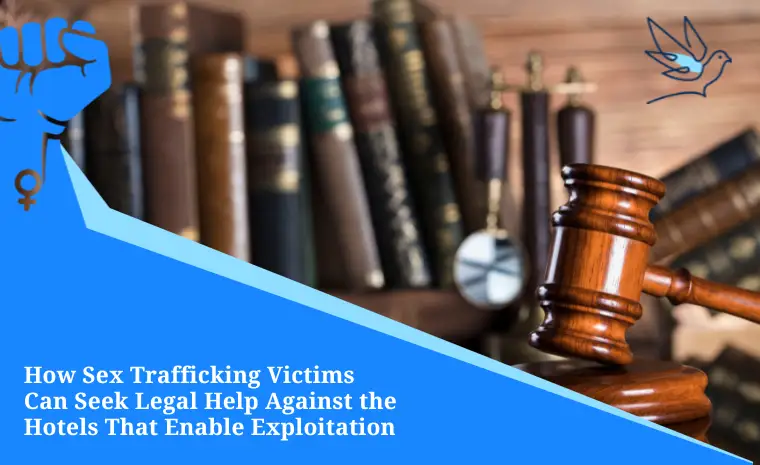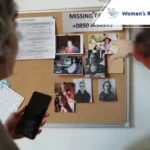How Sex Trafficking Victims Can Seek Legal Help Against the Hotels That Enable Exploitation
Sex trafficking, which includes physical abuse, sexual exploitation, and escort services, is an abhorrent crime that inflicts harm on millions of people globally. Regrettably, it remains a profitable industry for many offenders, with hotels frequently acting as the main venue for such unlawful activities.
Even though sex trafficking is illegal, several hotels overlook the exploitation of vulnerable individuals, thus enabling it. Nevertheless, individuals who have been subjected to human trafficking have legal options to hold these hotels accountable and seek justice.
This article discusses how sex trafficking victims can seek legal help against the hotels that enable exploitation, as well as strategies to avoid finding themselves in such circumstances.
Understanding Human Trafficking and Exploitation in Hotels
Human trafficking refers to the exploitation of individuals through various means, including the use or threat of force, coercion, abduction, fraud, or deception.
These practices encompass a wide range of activities, such as forced labor, debt bondage, domestic servitude, forced marriage, sex trafficking, drug trafficking, and the recruitment and deployment of child soldiers, among others.
Sex Trafficking
This form of trafficking involves using force, fraud, or coercion to exploit individuals for commercial sex acts. The exploitation often takes place in hotels, where traffickers book rooms and use them as a base of operation for their illegal activities.
Individuals who have been trafficked are frequently forced into engaging in commercial sexual activities, which can involve:
- Prostitution
- Escort services
- Erotic dancing establishments
- Massage parlors
- Pornography
- Sexual violence
There are cases where sex trafficking victims are lured into forced marriage under false pretenses and later exploited for prostitution or domestic labor.
If minors are involved in commercial sex or any activities that promote prostitution, they are automatically classified as victims of minor sex trafficking, regardless of whether or not force, fraud, or coercion was used.
Victims of sex trafficking face significant challenges in seeking legal help. They often suffer from trauma and fear of retaliation from traffickers. Furthermore, hotels are often reluctant to cooperate with authorities in identifying and stopping sex trafficking on their premises.
Labor Trafficking
Labor trafficking, also known as modern-day slavery, involves using force, fraud, or coercion to recruit, harbor, or transport an individual for labor services. It occurs in various industries, including domestic servitude, restaurant work, janitorial work, factory work, migrant agricultural work, and construction.
This type of trafficking is often characterized by poor living and working conditions, little or no pay for the work performed, debt bondage, and document servitude. It takes place both in homes and workplaces and is frequently perpetrated by traffickers who share the same cultural origin and ethnicity as their victims, allowing them to use cultural power and class hierarchy as resources to control and manipulate their victims.
Labor traffickers, sometimes business owners, may also intimidate their victims, telling them that they will be deported or that they have nowhere to run. Victims of labor trafficking are often taught not to trust anyone except their traffickers, making them wary of genuine offers of help, as they expect to be asked for something in return.
Got caught up in a sex trafficking situation?
Identifying The Victim
Victims of trafficking can come from diverse backgrounds and be of any nationality, including US citizens, Lawful Permanent Residents (LPRs), or foreign nationals. They can be found in both urban and rural areas.
A human trafficking victim could be anyone, such as a man who speaks limited English and exhibits suspicious injuries while working, or a woman who has been abused and is unable to identify her current location when seeking medical care.
Other possible victims include individuals who attend church regularly but are visibly fearful and withdrawn or children who reside in the area but do not attend school or engage in outdoor activities.
Why Hotels?
Hotels have become a common venue for sex trafficking because of their accessibility and privacy. Traffickers can use hotel rooms to exploit California sex trafficking victims without arousing suspicion or attracting unwanted attention from law enforcement. Additionally, some hotels may turn a blind eye to suspicious activity, making it easier for traffickers to operate.

Steps Victims Can Take to Seek Legal Help
Victims of sex trafficking or potential victims of all genders often find themselves trapped in a cycle of exploitation with no means of escape. However, they can seek legal help against the hotels that enable such activities. Legal action may include filing lawsuits against the hotel, reporting the hotel to authorities, or seeking damages for injuries sustained while being exploited at the hotel.
Legal advocates for sex trafficking victims play an essential role in helping victims seek justice and holding hotels accountable. They work tirelessly to investigate instances of trafficking and exploitation at hotels and gather evidence to support victims’ claims. Additionally, legal advocates may work to raise awareness about sex trafficking and educate the public on how to identify and report instances of exploitation.
If you or someone you know is a victim of sex trafficking, you can take the following steps to seek legal help and hold hotels accountable for their role in exploitation:
1. Call the National Human Trafficking Hotline
If you suspect sex trafficking is taking place in a hotel, contact local law enforcement immediately. You can also contact the National Human Trafficking Hotline at 1-888-373-7888 or text “HELP” to 233733 for immediate assistance.
This hotline is a confidential resource that accepts tips related to potential cases of both labor and sex trafficking. It can facilitate the reporting of these cases to specialized human trafficking task forces, federal authorities, local law enforcement, and service providers across the nation.
The hotline staff are equipped to:
- Offer a listening ear to survivors of any type of human trafficking
- Provide prompt safety planning to individuals in urgent need of assistance
- Receive and assess tips related to suspected trafficking cases
- Assist survivors in comprehending their available support options without any form of bias or judgment.
2. Preserve and Document Evidence
If possible, document any evidence that may help in identifying the victims, traffickers, or the hotel’s role in all forms of trafficking. This can include license plates of suspected traffickers’ vehicles or descriptions of suspicious behavior by hotel staff.
The search for evidence in sex trafficking cases involves the police obtaining and executing search warrants, with the possibility of needing additional warrants based on new facts discovered during the initial search.
Physical evidence can include documents and other items kept by the trafficker such as debt and income ledgers, while victims may possess items such as diaries, provocative clothing, and sex paraphernalia.
Digital evidence found in cell phones and laptops should also be examined. In addition, officers should photograph or film the locations searched, including any restraints, posted rules or notices, and evidence of additional commercial sex locations and agents of the sex trafficker. This kind of evidence is compelling to jurors and can prove that victims were not there willingly.
3. Contact a Sex Trafficking Attorney
Victims of sex trafficking can seek legal help from attorneys specializing in this area of law. These attorneys can help victims file a civil lawsuit against hotels that enable sex trafficking.
Contacting a sex trafficking attorney can be a critical step in seeking justice for victims and holding perpetrators accountable. Sex trafficking is a complex crime that can involve multiple parties, including traffickers, buyers, and those who facilitate the trafficking operations, such as hotels, transportation companies, and websites.
In addition, victims of sex trafficking may face various legal and immigration issues, including criminal charges, deportation, and difficulties accessing services and support. They can also help address the systemic issues that enable trafficking to occur, such as advocating for policy changes and holding businesses accountable for their role in facilitating trafficking.
By working with victims, advocates, and law enforcement, sex trafficking attorneys can help prevent future cases of trafficking and ensure that those responsible are held accountable for their actions. They can also help victims access critical resources, such as medical care, counseling, and housing.
4. File a Civil Lawsuit
Victims of sex trafficking can file a civil lawsuit against hotels that enable sex trafficking. These lawsuits can seek damages for the harm suffered by the victim, as well as punitive damages against the hotel for its role in the exploitation.
Hiring a knowledgeable sex trafficking attorney give guided legal representation to victims, as well as helps navigate the complex legal system. They can assist with filing criminal charges against traffickers, seeking compensation for damages, and advocating for victims’ rights in court.
Frequently Asked Questions
Can victims of sex trafficking sue hotels for their role in exploitation?
Yes, victims of sex trafficking can sue hotels that enable exploitation under one of California sex trafficking laws, Penal Code 236.1.
What damages can victims of sex trafficking seek in a civil lawsuit against hotels?
California sex trafficking victims can seek damages for the harm suffered, including emotional distress, physical injuries, and financial losses. They can also seek punitive damages against the hotel for its role in the exploitation.
What should victims do if they fear retaliation from traffickers or hotels?
Victims of sex trafficking should contact law enforcement and an attorney specializing in California sex trafficking laws to seek legal help and protection.
Holding Hotels Accountable: Seeking Justice for Victims of Sex Trafficking
Hotels enabling sex trafficking must be held accountable. Victims can seek justice by contacting law enforcement and working with an attorney to hold hotels accountable and seek compensation. It’s crucial for hotels to prevent trafficking by training staff, implementing reporting policies, and cooperating with authorities. Sex trafficking is a horrific crime affecting millions, and it’s vital to take immediate action and seek legal help.
Let Women’s Rights Group Help You
If you or someone you know is stuck in a human trafficking situation in the hotel industry, the Women’s Rights Group can help.
As a national organization dedicated to supporting survivors of sexual abuse in commercial settings, our anti-trafficking services have helped many women obtain the financial compensation they need to begin anew.
The Women’s Rights Group can assist you in obtaining medical care and legal representation to assist you during this challenging period. Get in touch with us today for a confidential, no-cost consultation, or complete our contact form to discover how we can be of service to you.






